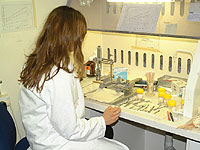Drug Development - 9060
Program Summary
Faculty: Faculty of Medicine
Contact: drugdev@unsw.edu.au
Campus: Kensington Campus
Career: Postgraduate
Typical Duration: 3 Years
Typical UOC Per Semester: 12
Min UOC Per Semester: 3
Max UOC Per Semester: 27
Min UOC For Award: 72
Award(s):
Master of Medical Science (Specialisation)
Information valid for students commencing 2013.
Students who commenced prior to 2013 should go to the Handbook's Previous Editions
Program Description
The program is designed for persons wishing to pursue careers that relate to the development and safe use of medicines. Career opportunities exist in the pharmaceutical manufacturing industry, government and in research institutions such as universities. Health care professionals interested in developing new medicines and improving the use of existing medicines will find the course of value. The extensive range of electives enables the candidate to specialise in particular areas such as the discovery of new medicines, regulatory affairs, clinical trials, market development, medical department administration, preclinical studies, etc.
To fulfil the program requirements students must satisfactorily complete eight core courses plus four elective courses, each worth 6 units of credit.
Program Objectives and Graduate Attributes
Learning Outcomes
Assessment will be based on the ability to apply principles to problem solving. There will be minimal emphasis on memorization of factual material. Both written exams and assignments will be based on scenarios i.e. case-type situations that require the exercise of comprehension, judgement, and an understanding of the issues involved.
Education and Assessment
Will be based on high-quality information delivery, application of this information through assignment work, and written examinations. This will form the platform for the assignment work that will be based mainly on the primary (i.e. research) literature. A key feature of assignment work will be development of critical appraisal skills for research papers. Students will also be issued with workbooks for each course that will set out assignment work and other tasks. This will be supported by the on-line learning system, Blackboard, which provides all course information including assignment work, student questions and answers, chat rooms, etc. Students will study the manuals at their own pace within allocated time periods (nine weeks per course). There will be telephone tutorials for each course and two weekend workshops per Session. Tutors will be available for Q&A by email.
Program Structure
In the first year of study, the courses within the program start with a general overview of the drug development process, with a focus on drug discovery, chemistry relevant to drug discovery and development issues, pharmacokinetics and codes of practices and standards, and regulation of medicines in Australia. Significant attention is given to understanding the pharmacology and pharmacodynamic properties of drugs and how this relates to pharmacokinetics also. This is explored further in drug safety assessments leading up to the first human clinical testing. As the story of development of a drug from discovery through to human testing progresses in the program we deal with the important principles of clinical trial practice and management. This includes protocol development, obtaining regulatory and ethical approval, planning trial recruitment, data management and data reporting. The course closes with an introduction to the Law as it pertains to the development of new drugs. Emphasis is upon Administrative Law as it applies to the review of regulatory decisions provided by the Therapeutic Goods Act. The processes involved in the regulation of medicines, including prescription and non-prescription medicines, and medical devices within Australia are discussed in detail, along with the requirements of other international agencies.
In the second year of the program, students examine issues related to the formulation of new medicines, with a strong focus on quality of product, examination of impurities and stability of the new medicine. The program also includes methods of assessment and prevention of adverse events, reporting responsibilities and the use of safety information databases. Protection of intellectual property relevant to the industry is examined. Students conclude their program by examining the use of statistics in design of clinical trials and assessment of data, and the importance of decision making throughout the drug development process.
In the final year of the Masters program, students select four elective courses from those offered within the Drug Development suite. This gives students an opportunity to specialise in an area that is of particular interest to them, or where they have no experience and want to broaden their knowledge.
Below is a list of core and elective courses for the Master of Medical Science in Drug Development. Generally students must take all core courses and sufficient electives to give a total of 72 units of credit. The program proceeds in three stages, which correspond to Years 1 to 3 for students proceeding in the minimum time.
Course Selection
Session 1
Session 1
- PHAR9103 Biostatistics and Trial Design (6 UOC)
- PHAR9128 R & D (6 UOC)
Session 1
- MNGT5251 Marketing Management (6 UOC)
- MNGT6210 Accounting & Financial Mngt (6 UOC)
- MNGT6275 Managing People & Organisation (6 UOC)
- MNGT6302 Economics in Management Pract (6 UOC)
- MNGT6321 Corporate Finance (6 UOC)
- MNGT6371 Managing Change (6 UOC)
- MNGT6372 Managerial Skills (6 UOC)
- MNGT6380 Law for Practising Managers (6 UOC)
Academic Rules
Fees
Area(s) of Specialisation









